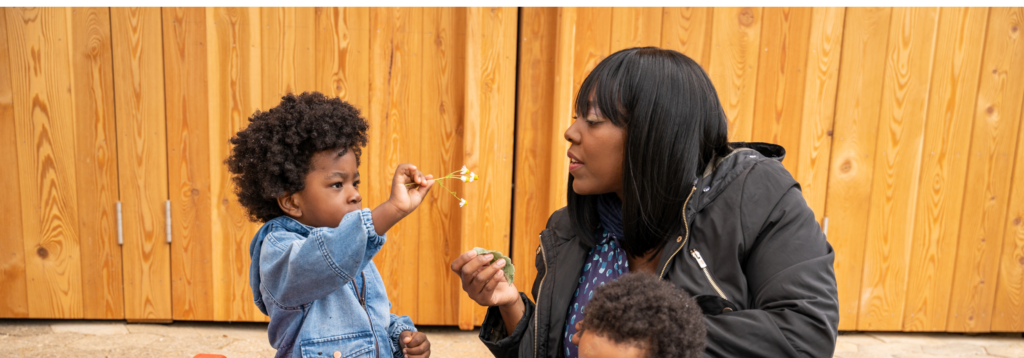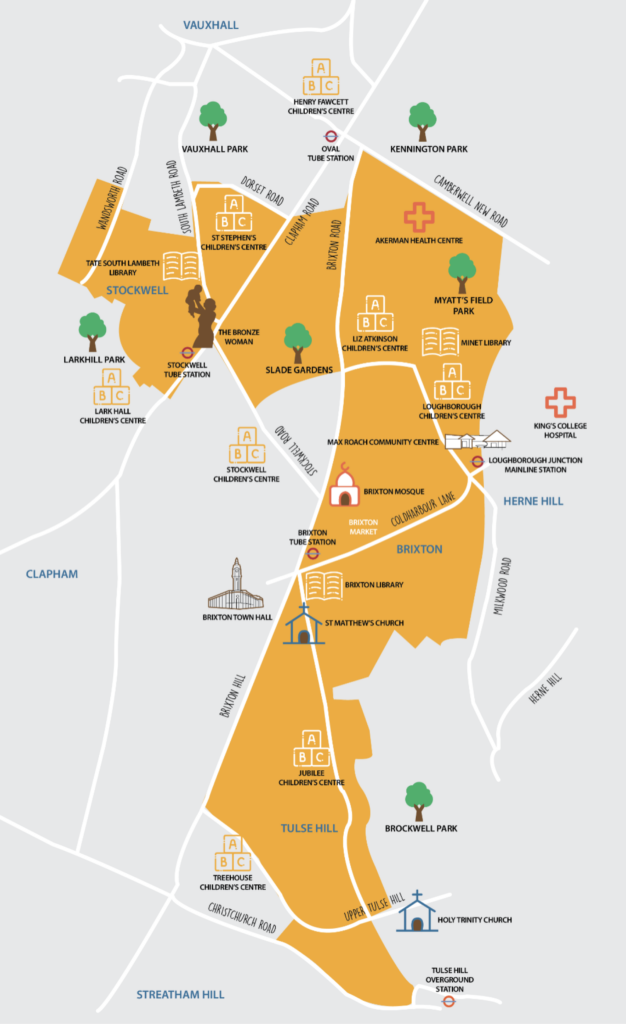Community Engagement in a diverse inner-city area – Executive Summary
Executive Summary
Community Engagement in a diverse inner-city area
Scalable approaches to reaching families with babies and young children
1.0 Lambeth Early Action Partnership

Lambeth Early Action Partnership (LEAP) has delivered a complex programme of community engagement in an inner-London community where 68% of children live in very deprived neighbourhoods1.
In the areas where LEAP works, there are greater inequalities for young children compared with the rest of Lambeth. The LEAP area stretches from Stockwell to Myatt’s Field, and through North Brixton to Tulse Hill, covering about 20% of the borough.
LEAP is one of five local partnerships which make up A Better Start, a national ten-year (2015-2025) programme funded by the National Lottery Community Fund that aims to improve the life chances of babies, very young children, and families.
LEAP is supported by the National Children’s Bureau charity (NCB). LEAP works with a wide range of children, families, practitioners, and organisations across Lambeth. We fund, improve, and evaluate over 20 local services, meeting the needs of families through pregnancy and the early years of childhood. LEAP monitors a range of childhood outcome indicators in the local population. Many of these indicators demonstrate unequal outcomes for children. By providing services for children and families in the LEAP area, LEAP aims to narrow the inequalities gap and see improved outcomes for all children.
LEAP’s aim is to:
- Improve early childhood development outcomes for all children living in the LEAP area.
- Reduce local inequalities by supporting those at greater risk of poor outcomes.

In 2021 there were approximately 64,800 people living in the LEAP area, of whom around 2,641 were aged under 4-years-old2. This area is densely populated, and comprises a diverse, culturally rich inner-London community. English is not the first language of almost 1 in 5 residents in the LEAP area (19% of the population)3. Economic disadvantage impacts the lives of many families.
Key facts about the population living in the LEAP area:
41% of residents were not born in the UK4.
70% of residents did not identify as white British4.
90% of 5-year-olds were not identified as white British5.
19% of residents had English as an additional language4.
40% of 5-year-olds had English as an additional language5.
47% of residents were living in social rented housing4.
43% of LEAP neighbourhoods were classified as most deprived6.
68% of children were living in very deprived neighbourhoods7.
In the financial year 2021/22, 581 babies were born to women and birthing people living in the LEAP area8.
The main aim of LEAP’s Community Engagement programme is to connect families to the 20+ LEAP services as well as to each other.
From 2017 to 2023 LEAP’s community engagement programme delivered:
- 1,824 events which reached 3,058 families and 3,437 children
- 29 early years forums (designated spaces for parent engagement)
- 1,483 keeping-in-touch sessions –regular small scale activities in community settings for families with babies and young children.
- 299 one-off events – including 10 themed festivals.
In total this has resulted in:
- 36,000 attendances (this includes individuals attending multiple events) and
- 5.41 times was the average number of times an individual engaged with us (by area of residence).
More key stats about our Community Engagement programme
In 2021 LEAP’s Community Engagement programme reached 31% of all children living in the LEAP area.
One in five families, whose initial contact with Lambeth Early Action Partnership (LEAP) is through community engagement activities9, then go on to use other LEAP services.
Families, whose first contact with the LEAP programme is through community engagement activities, and then go on to use another LEAP service, engage with more LEAP services on average compared with families that first enter LEAP’s programme through other routes. These families also tend to engage with more sessions per service.
2.0 LEAP’s four key elements of effective community engagement
The core values which drive our community engagement work
Recognising parents as experts
Making connections
Building trust
Placing partnerships at the heart
2.1 Working with and being led by families
Our parent volunteers are known as Parent Champions. They use their local knowledge to support other parents and carers, introducing them to children’s centres, LEAP services and broader early year offers. They help connect local families. LEAP is committed to supporting the personal development of all our volunteers. We supervise and train our Parents Champions, providing them with the resources they need. Read more.
We recognise parents and carers as experts. Our People in the Lead (PiL) sessions are participation spaces for parents and carers of babies and young children (aged 0-4 years). We support and encourage parents and carers to share their opinions, experiences, and ideas. We share their feedback within our network so that partners and practitioners can improve LEAP services and activities. We provide next steps and updates to parents and carers following PiL sessions. This participation model has shown itself to be an effective blueprint for LEAP working with local families and embedding their voice in decision-making. Read more.
2.2 Building trust and developing connections
Establishing trust with parents and carers with very young children is important to build engagement. Running activities in safe local spaces, making our activities family friendly, and having a consistent staff presence at all engagement events helps us build rapport and trust. Once trust is established, local families are more open to participating in other LEAP services and activities, and parents feel more confident to communicate their needs and thoughts in honest feedback about events they have attended. We value and take on board ideas and feedback from families who attend our activity sessions and events or use our services. Read more.
2.3 Ensuring LEAP’s community engagement programme is structured and informed
LEAP uses a festival model to develop, market, and deliver all our sessions and events under one unifying theme. Planning three themed festivals each year enables us to meet the needs of specific segments and groups of families in the community.
We strive for high-quality provision and ensure that the facilitation of LEAP sessions and events are of a high standard. The quality of provision creates a positive experience for families, which creates better engagement.
Our online booking platform has improved how families discover and book their free places at LEAP events. We offer bespoke support for families by age of children and location. Parents appreciate our tailored advice.
Using family-friendly themed festivals as our flagship model reflects community need, enabling an integrated approach to marketing, while keeping our offers fresh. Read more.
2.4 Collaborative partnership working with local organisations
LEAP has partnership at the very heart of its working model. We know that no one organisation or service can meet the many needs of local families. Collaborative working is particularly important in our community engagement work. Read more.